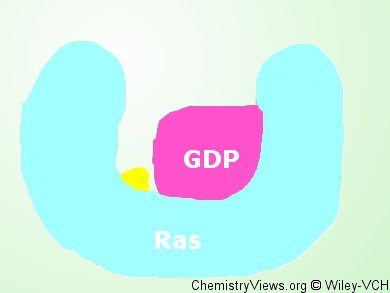Ras is one of the most important cancer-causing proteins. When bound to the nucleotide guanosine triphosphate (GTP), Ras is active and, thus, it transmits cells a signal to divide. In healthy cells, this proliferating signal can be switched off as Ras is able to hydrolyse GTP to GDP (guanosine diphosphate), thereby becoming inactive. In lung cancer cells, however, Ras undergoes a mutation whereby a glycine residue in position 12 is replaced by a cysteine. This aminoacid substitution renders Ras unable to hydrolyse GTP, and, thus, it traps Ras in a constantly active state which drives tumor growth.
Jonathan Ostrem and colleagues, University of California, San Francisco, CA, USA, report the first mutant-specific Ras inhibitors. The researchers discovered a panel of compounds which bind irreversibly to cysteine 12 of mutant Ras. The new compounds shifted Ras affinity from GDP to GTP, thereby causing the accumulation of an inactive, GTP-bound Ras. As a consequence, they blocked Ras activity in cancer cells. Furthermore, since Ras cysteine 12 residue is present in tumor cells but not in healthy ones, the new compounds showed a certain selectivity for cancer cells, blocking their proliferation preferentially.
- K-Ras(G12C) inhibitors allosterically control GTP affinity and effector interactions,
Jonathan M. Ostrem, Ulf Peters, Martin L. Sos, James A. Wells, Kevan M. Shokat,
Nature 2013, 503, 548–551.
DOI: 10.1038/nature12796




